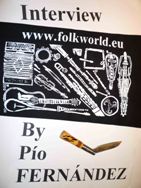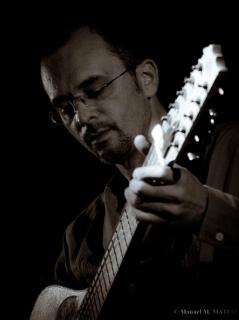
Ángel GOYANES is the founder and director of Spain’s leading paper magazine dedicated to folk music: Interfolk. This article contains the first part of an interview where Ángel tells us about his starts on folk, and his views about the past and the present of this music in 2012. This article in English is a synthesis of the full interview which is published in Spanish in this FolkWorld issue.
Learning and Playing Folk Music
The interest of Ángel GOYANES in music started in the 1980s in Madrid, mainly focussed on instrumental music: classical, symphonic rock, techno,… At the age of 16 he began learning to play the acoustic guitar, which strengthened his appreciation for classical music.
He soon started to play music with other friends. The songs of artists such as Mike Oldfield, Herbie Mann (funk), or Les Luthiers (Argentine music & comedy group), were a big source of repertoire and inspiration. Shortly after, folk and world music also became an important influence: Celtic, Greek, Hungarian, Sephardic, and also Castilian (from Agapito Marazuela’s repertoire). In 1992, Ángel started playing cittern (equivalent to the 10-string bouzouki), and that significantly defined the style of music that he played in the following years.
The folk music that became relevant in those early years was from bands such as: Gwendal (with their album ‘Irish Jig’), Labanda (an important Celtic rock band in the 1980s in Madrid), Milladoiro (in Galicia), Oskorri (in the Basque Country), and La Musgaña (Madrid). A few years later, new artists (mainly from northern Spain) were also discovered such as: Emilio Cao, Arco da Vella, Xorima, Cornamusa, Hato de Foces, Luar Na Lubre, Llan de Cubel,…
The influences from foreign artists arrived mainly from Ireland and Scotland at that time: The Chieftains, Planxty, The Battlefield Band, Nightnoise, Capercaillie, Enya, … But also from the Nordic and Eastern European countries, klezmer music, Portugal (Xulio Pereira), etc…
The first band where Ángel Goyanes played folk music was called Yorandav, which became quite popular in Madrid, and they played in several clubs and pubs until the mid 1990s. In 1997, the musician José-María Climent (one of the founder members of La Musgaña) invited Ángel to play with him in another important band: Contrabanda. That became a very intense period where he could learn and improve a lot of his skills on folk music, while playing in a group with experienced band members.
About the places that are a key for the development of a folk music career, Ángel considers that small clubs or concert halls are essential for the initial steps of any performing musician. Unfortunately, such kind of places are not as easily found as somebody could expect in a big city such as Madrid. Pubs such as Taberna Elisa, Taberna Triskel, La Fontana de Oro, El León de Oro, Café de la Palma, or Elígeme, are some of the few that he remembers from his early starts with Yorandav.
Folk music festivals in all parts of Spain are the other vital resource for the career of a band, and the list of (mostly summer) events continuously increased from the 1990s until the early 2010s. Veteran festivals would be, for example: Folk Segovia, Ortigueira, Cita Folk de Jódar, Parapanda Folk, Poborina Folk, Orejo,… But there were other promising younger ones: Demanda Folk, Viso del Marqués,… Just in the city center and in the towns around Madrid, there were important ones such as: FolkInvierno (Las Rozas), MadridFolk, Folk Chinchón,… In this issue of FolkWorld there is a whole article covering all these events across Spain.[47]
What will be left from all the above lists of pubs, concert halls, festivals? As the economical crisis continue in Spain, no one knows for sure. But a long series of bad news has already started and it does not seem to stop spreading pessimism.
Folk Music in Spain
The view that Ángel GOYANES has about the starts and the evolution of the latest folk music revival in Spain dates back to the late 1960s with bands such as Nuestro Pequeño Mundo or ‘El Mester’.[40] Those beginnings of the folk music made in central Spain were soon followed by the ‘Celtic’ folk revolution that came from bands such as Gwendal. As the years passed by, the consolidation of the Celtic music movement in northern Spain, younger artists came into play since the late 1980s, such as: Carlos Núñez, Kepa Junquera, Hevia, Celtas Cortos,…

Among the many bands and musicians that have emerged on the folk scene in Spain since the early 1970s, the top four that Ángel Goyanes would specially mention are:
Radio programs have also been an important pillar for the consolidation of folk music in Spain. RTVE Radio 3 has been fundamental thanks to programs such as Trébede with Iñaki Peña, Diálogos 3 with Ramón Trecet, or Discópolis with José-Miguel López.[43]
A few small record labels have also done an excellent job for the support of folk music in Spain, keeping a high level of quality on the sound recording and the booklet edition.
At the end of the day: Is Spain’s crisis in the 2010s severely affecting the different folk music activities across the country? Generally speaking: Yes, a lot.
On the other hand, folk music is by nature very well adapted to go back to improvisation and the performance in small scenarios in many kind of places, even in open air, and even more in some unique landscapes with wild life beauty, and historical places with rooted traditions. Folk music is also very flexible when openly allowing all people to participate with dancing, singing, instrument playing and learning. And the reaction of the Spanish population interested in folk music is still positive for all those aspects. So there is still room for optimism.
Photo Credits:
(1), (3) Ángel GOYANES,
(2) LLAN DE CUBEL,
(4) HEXACORDE & Vanesa MUELA,
(5) BALBARDA @ TABERNA DE ELISA,
(6) NUESTRO PEQUEÑO MUNDO (NPM),
(7) NUEVO MESTER DE JUGLARÍA,
(8) LA MUSGAÑA (unknown).